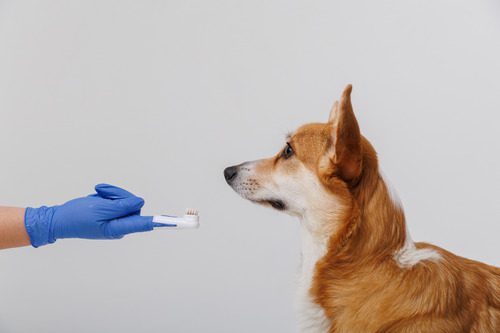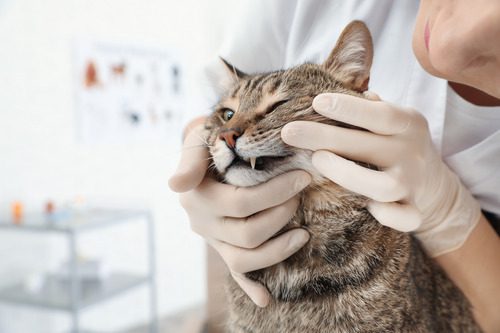Pet Owners: The Symptoms of Heartworm in Dogs in Raleigh, NC
If you’re a dog owner, odds are good that you’ve already heard of, and are preventing your pup from contracting, heartworms. Your veterinarian will ask you at every annual check-up about what steps you’re taking to prevent heartworms and will recommend a blood test to ensure your dog has not been infected.
What Are Heartworms in Dogs?
Heartworm disease is the name assigned to a parasitic worm. Mosquitos play the role of the intermediate host and pass the larvae of the worms to your pet through a single bite. This is how heartworm disease is contracted and passed along to other pets.
If a mosquito bites an animal infected with heartworms, they become infected with the larvae. The infected mosquito will then pass the larvae on to the next animal it bites. It takes six to seven months for heartworm larvae to reach maturity, and this is when the adult heartworms set up home inside the heart, vessels, and lungs of their host. They then mate and the larvae are released in the dog’s blood, completing the cycle.
Unfortunately, adult heartworms can live inside a host for up to seven years. The average number of adult worms inside an infected host is twelve, however that number can reach to over two hundred under the right circumstances.
Female adult heartworms are between ten to twelve inches in length, while males are only between four to six inches. Because of their size and where they live, an infection of heartworms causes heart failure, lung disease and other organ failures.
What Are the Symptoms of Heartworms in Dogs?
There are four stages of heartworm disease in dogs and each stage comes with its own symptoms.
Stage One
This is right after the infection occurs. Dogs are happy and appear healthy. At this point, the infection will likely not be picked up even by your veterinarian in Raleigh, NC, as blood tests tend to come back negative early on.
- The only symptom you might see in your dog is a slight, occasional cough.
Stage Two
You may start to see some moderate symptoms in the second stage of infection; however, it still can be hard to spot. At this point, there’s a higher chance a blood test will show whether your dog is infected or not.
- Your pup may have a lingering cough that is unproductive in nature.
- You might notice your dog getting easily tired during exercise and unable to maintain his usual pace or stamina.
Stage Three
At this point, your dog’s health is noticeably declining. If infected, the blood test will show up positive and by this point, the worms will be visible on x-rays. The following are symptoms of heartworms in dogs seen in stage three:
- The cough has not subsided, and possibly grown worse and more persistent. You may notice your pet coughing up blood.
- Your dog has started to lose weight, even though they’re eating regularly.
- Your dog will continue to be extraordinarily fatigued after exercise or may even be reluctant to exercise at all.
- Your pet is lethargic, sleeping often, and unwilling to do much.
- You may see that your pup is having trouble catching his breath after little to no exercise.
Stage Four
This is also referred to as Caval Syndrome. There are enough worms inside your dog’s heart to block arteries and restrict blood flow, which is extremely dangerous and life-threatening. The only treatment for this stage is surgical removal of the worms. This is a risky surgery, and most dogs do not survive at this stage.
- Your dog is very lethargic and unwilling to get up for the most basic tasks.
- Loss of appetite is also seen in dogs at this point because they are either too tired or too uncomfortable to eat.
- Fluid may be collecting in your dog’s lungs, which is noticeable by a bulging of the ribs.
- Your vet will be able to detect a heart murmur and abnormal lung sounds.
- An enlarged liver is another sign of late-stage heartworm disease.
What Can Be Done?
For dogs in stages one through three of heartworm disease, there is hope.
According to the American Heartworm Society, this is what can be done for your pet:
“Only one drug, which is called Melarsomine (also known as Diroban or Immiticide), is approved by the U.S. Food and Drug Administration (FDA) for treatment of heartworm infection in dogs; this drug should be administered by injection in the veterinary hospital. Although there are some risks associated with this medication’s use, most adult worms die quickly and can be eliminated within 1 to 3 months. Cage rest and drastically restricted exercise during this period can decrease the chances of complications from treatment.
Along with Melarsomine, the heartworm treatment protocol recommended by the American Heartworm Society includes several other medications that help improve the chances of treatment success and reduce the incidence of side effects. This includes administering specific heartworm preventive medications (such as Simparica Trio) to an infected dog for 2 months prior to Melarsomine treatment. Not all heartworm preventive medications are safe to administer to heartworm positive animals and should only be administered under direction of your veterinarian. Long-term, continuous use of heartworm preventives alone to treat heartworm infections, however, is not recommended as an alternative to Melarsomine, because it is well documented that additional damage to the heart and lungs occurs the longer adult heartworms are present.“
Heartworm disease treatment on an infected pet is costly. The average cost ranges between $500 and $1,200. This is because treatment occurs over the span of months and requires frequent x-rays, hospitalization and blood tests.
How Can Heartworms Be Prevented?
Thankfully, there are affordable options to prevent your dog from ever contracting heartworms in Raleigh, NC. There are plenty of heartworm preventatives on the market and all can be prescribed by your veterinarian.
They come in the form of tasty chewable tablets or an injectable medication provided by your veterinarian. The chewable treatments must be repeated monthly, but often protect your pet from other parasitic infections, such as fleas and intestinal worms. The advantage to the injectable treatment is is that there are two options that last from six to twelve months..
Heartworm disease is 100% preventable. The absolute best way to protect your dog is to give them one of these preventative treatments. Heartworms and their larvae have been reported in all fifty states in the US. It is more prevalent in the southeast and around the Gulf of Mexico because mosquitos thrive in the warm, humid air, enabling them to spread the parasite year-round. Because Raleigh, NC is located in the southeast, your animal companions are at a higher risk year-round for contracting heartworm disease if left untreated.
Some symptoms of heartworms in dogs can be hard to notice but if caught early enough there are treatments to help. If you have concerns that your dog might have heartworm give your veterinarian a call at 919-847-6216 at Bowman Animal Hospital & Cat Clinic and make an appointment.
Recent Posts
Firework Safety & Anxiety Relief for Pets This Fourth Of July
Firework Safety & Anxiety Relief for Pets This Fourth of July The Fourth of July is a…
Dental Cleaning for Dogs: Why It’s Important
Dental Cleaning for Dogs: Why It’s Important When was the last time you checked your dog’s teeth?…
Cat Gingivitis: Symptoms, Causes, and Treatment
Cat Gingivitis: Symptoms, Causes, and Treatment Your cat’s mouth plays a crucial role in their overall health,…
Managing Cat and Dog Anxiety During the Holidays
Managing Cat and Dog Anxiety During the Holidays Let’s face it: our pets are part of our…
Managing and Treating Joint Pain in Senior Pets
Managing and Treating Joint Pain in Senior Pets November is Senior Pet Month, and it’s the purr-fect…
About Bowman Animal Hospital & Cat Clinic
Established in 1986 by Dr. Gale Bowman, Bowman Animal Hospital and Cat Clinic is dedicated solely to the health and well-being of our pet community. We are a team of compassionate veterinarians and pet lovers who invest our time and resources into providing the very best medical care to your pet.







